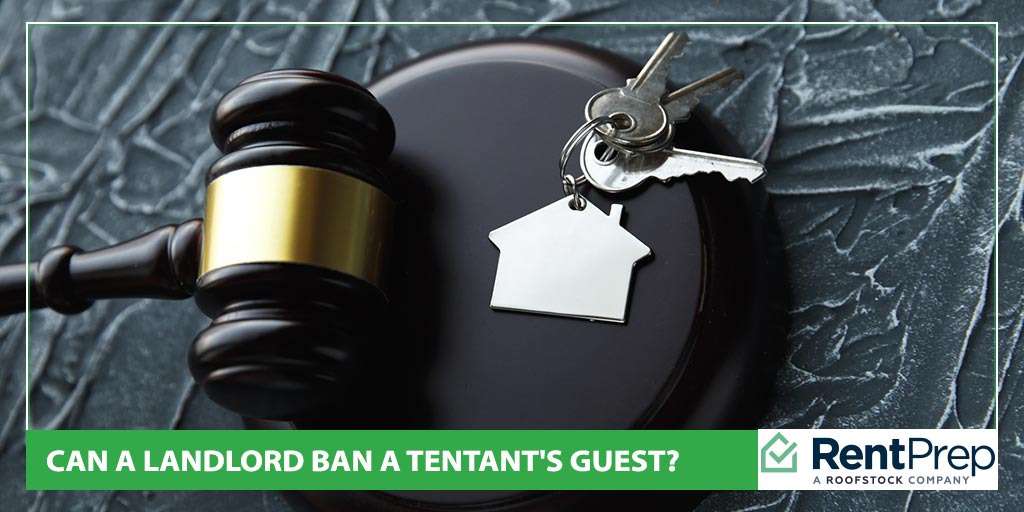
When you lease your property out to a tenant, you remain the owner of the property but most of the day-to-day rights use of the property are transferred to the tenant. This means that they are in charge of what time to turn the light outs, they are in charge of what temperature to set the thermostat at, and they are in charge of who can come in and out.
Sometimes, the tenant will invite over a guest or two that you don’t feel so great about. Maybe it’s not for any particular reason, but you get the urge to protect your property. What is a landlord’s right to ban a guest, and would it apply in this type of situation?
The rules about this are complicated. Is it legal for a landlord to ban a guest? Not without a qualifying legal reason, no, and those reasons are quite limited. Today, we’ll break down this complex issue so that landlords like you have a solid guide to follow.
A Table Of Contents On The Right To Ban Guests
- A Word Of Warning
- Can A Landlord Ban A Tenant’s Guest?
- Reasonable Guest Limitations & Rules
- Ban Alternatives: Clear Leases & Regular Reviews
- State Laws: Pay Close Attention
- Common Guest Problems & How To React
A Word Of Warning
Before we proceed, heed these words: you want to move with caution in this type of situation. Acting rashly and trying to ban a guest without a legitimate reason could lead to a lawsuit, so you want to be sure to go about this in the right way. Keep reading to find out how.
Can A Landlord Ban A Tenant’s Guest?
Many tenants are left with difficult questions whenever their landlords suddenly demand that they not bring over certain guests. Tenants are left asking:
- Can a landlord ban my guest from the property for no legal reason?
- Can a landlord ban my guest because they look suspicious?

These questions, along with many others, may be asked by your tenant if you do not handle problems that you have with a tenant having guests in the right way. These are also the kind of questions that you don’t want to leave your tenant asking.
So, what is the answer? Are you, as the landlord, permitted to ban a tenant’s guest?
In most cases, the answer is going to be no; you cannot ban a guest from the property.
You can, however, set up specific guest rules and limitations that are part of the property agreement, and these rules can help ensure that you are not stuck in a difficult situation down the line.
Reasonable Guest Limitations & Rules
While you usually cannot outright ban a guest from the premises, most states and areas allow landlords to set up reasonable guest limitations and rules for tenants to follow. These limitations and rules should be outlined upfront with each tenant, and they should also be included in the lease agreement.
In particular, you will want to cover details like these:
- How long are guests allowed to stay over at the rental?
- When does a “guest” become a “tenant?” (i.e., after two consecutive weeks of staying during a four-month period, the “guest” must be added to a lease agreement)
- How many guests are allowed in the property at once? This may depend on the rental property size, proximity to other properties, and local regulations.
- Are guests allowed to use common areas and, if so, what are the limitations?
- Remind tenants that any lease violations committed by guests will be the tenant’s responsibility.
These are just the basic foundation areas that you will want to be sure are covered in your guest rules; you can add more to these so long as they fit in with local, state, and federal laws.
Ban Alternatives: Clear Leases & Regular Reviews
The best way to avoid a situation is to have a plan before the guests even arrive. Your tenant will have guests over, and you should not expect otherwise as that would be unreasonable.
It is, however, reasonable to expect that your tenant follows the guest limitations and rules that you have in place. As mentioned above, these types of rules need to be set up when the lease is signed so that they are part of the binding agreement between both parties.
Another way to ensure that your tenant doesn’t have any guests that are causing problems is to make sure that you keep up with any scheduled property checks or reviews. Some landlords do this yearly while others have asked their tenants to permit them more frequently when signing the lease.
However frequently you want to do these check, make sure that you are thoroughly checking for the following:
- Signs of any guests staying for extended periods of time (i.e., becoming an illegal occupant)
- Signs of damage potentially caused by guests
- Parking violations by guests
Address any of these issues with your tenant sooner rather than later. If addressed early on, you should be able to avoid the complications of an escalated problem.
State Laws: Pay Close Attention

Before we wrap up today’s fact sheet, it is important for you to remember one more thing. State laws about renting vary. This means that one state may allow certain guest limitations while others may not. The only way to be sure of what type of guest-related aspects are regulated by your state is to check into your state and local laws.
The laws in Kansas and Virginia, for example, both have different clauses about what can and cannot be done regarding guests.
Common Guest Problems & How To React
Finally, let’s cover some of the most common guest problems that landlords encounter and give you a quick cheat sheet on how to react in these situations.
Problem #1: Tenant has too many loud guests over, and those guests are causing complaints from neighboring tenants.
Give the tenant a notice letting them know what is going on and reminding them that while they are allowed to enjoy their property as they please, it is also part of their responsibility to allow their neighbors the same covenant of quiet enjoyment.
Problem #2: You suspect a tenant or their guest is dealing with drugs.
If this happens, you will need to check your local laws and also contact your local police to see what steps are next. You cannot accuse your tenants of anything, but it is reasonable to ensure that illegal activities are not happening at your property. The police will only be able to search the property, however, with the proper permissions.
Problem #3: Guest or guest’s pet causes damages to the property.
The tenant is responsible for their guest’s violations, so you will need to communicate this with them.
Problem #4: A guest has been staying for too long.
The guest will need to be added to the lease or leave. If the tenant and/or guest refuses, this breaks the lease terms and you will need to move to evict the tenant to regain control of your property.
Keep Things Clear
The best thing to do to prevent any potential guest problems is to keep things very clear with your tenant from day one. Include guest rules and limitations in the lease terms, and then be sure that you review these with the tenant. Answer any questions they may have, and remind them that you are always available to answer more questions as needed!
Open communication will help lower the chance of this type of problem happening at all.

